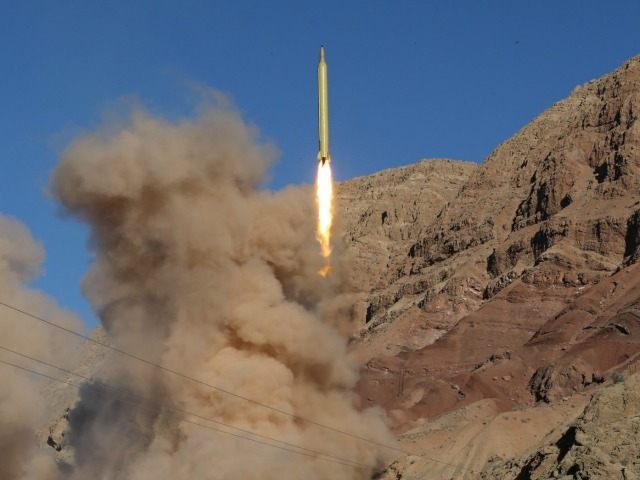Iran has developed land-to-sea ballistic missiles with the capability of hitting any ship from an estimated 435 miles, a top official from the Islamic Republic’s Revolutionary Guards Corps (IRGC) declared this week amid escalating tensions with the United States over Tehran’s missile program.
“We have managed to make land-to-sea ballistic, not cruise, missiles that can hit any vessel or ship from 700 km [435 miles],” Iran’s state-controlled Fars News Agency quoted Amirali Hajizadeh, the head of the IRGC’s airspace division, as saying on Tuesday, according to Reuters.
On Monday, Brian Hook, the U.S. special envoy on Iran, acknowledged that Iran’s ballistic missile program was intensifying tensions in Yemen, Iraq, and Syria, noting, “We are accumulating risk of regional conflict if we do not do more to deter Iran’s missile proliferation in the Middle East.”
The high-ranking IRGC official noted that the Shiite Islamic Republic’s Supreme Leader Ayatollah Ali Khamenei urged Tehran a decade ago to develop the capability of “hitting ships” with ballistic projectiles.
Hajizadeh “did not give details on the previous range of the missiles. In 2008, Iran displayed a ground-to-sea missile that it said could travel about 290 km (180 miles),” Reuters pointed out.
The IRGC’s revelation that it has more than doubled the 2008 range of Iran’s land-to-sea ballistic missiles comes a few months after U.S. President Donald Trump pulled out of the controversial Iranian nuclear program in May, arguing that the deal failed to meet expectations.
Under the deal, Iran was supposed to curb its nuclear program in exchange for sanctions relief.
President Trump also said the deal was flawed because it did not curtail Tehran’s ballistic missiles program or its support for terrorist proxies in Syria, Yemen, Lebanon, and Iran.
The Trump administration has reimposed sanctions that are expected to cripple the economy of Iran, deemed the world’s leading sponsor of terrorism by the U.S. government.
Iran has long claimed its missile program is only defensive and has threatened to disrupt oil shipments through the Strait of Hormuz in the Gulf if the Trump administration tries to strangle Tehran’s oil exports further.
Tehran has dismissed negotiations with Washington over Iran’s military capabilities. It also denies that its activities are brewing instability in the Middle East.
In September, the U.S. special envoy on Iran urged the Islamic Republic “to end its proliferation of ballistic missiles and halt further launching or development of nuclear-capable missile systems.”
“Iran has the largest ballistic missile force in the Middle East, with more than 10 ballistic missile systems in its inventory or in development,” he told reporters on September 20.
“Its ballistic missile program remains among the most significant challenges to broader nonproliferation efforts in the region and is an enduring threat to our allies and partners, including Israel.”

COMMENTS
Please let us know if you're having issues with commenting.